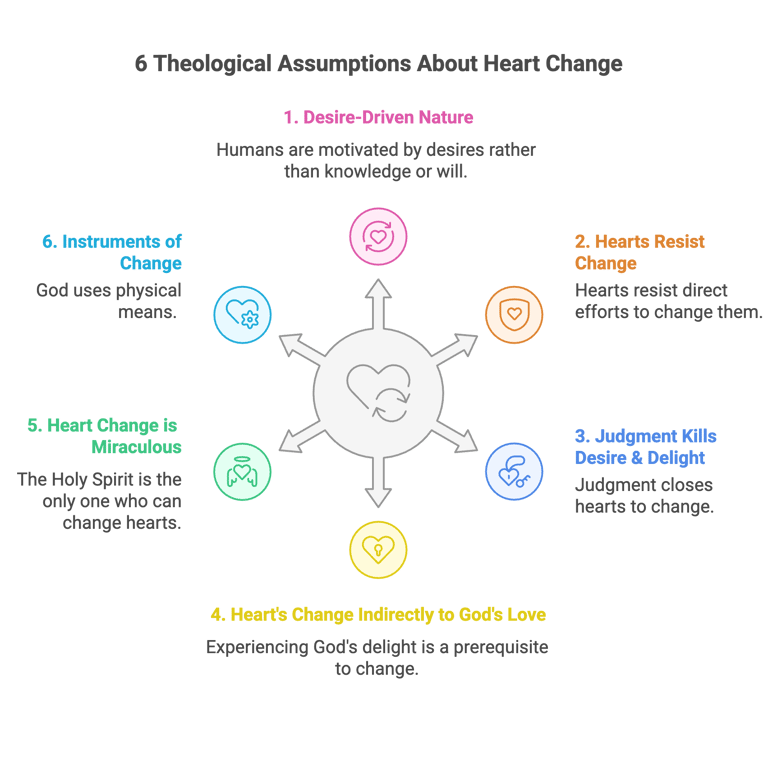3. The Heart of the Matter Part 1: 6 Crucial Truths About Heart Change
Brandon Booth
6/16/20257 min read
Never miss a post! Signup for my email updates today and get expert guidance delivered directly to your inbox!
Last week we built the theological engine that powers effective Christian ministry. But what is the fuel that makes this engine work? What are the theological principles behind heart change?
Today I want to unpack the deeper theological principles that fuel real change. Again, I'm deeply grateful to theologian Simeon Zahl, whose Augustinian insights have shaped much of what I'm about to share.
And as always, you don't need to agree with my theological framework. Instead, use this as a starting point to explore your own assumptions about how hearts actually change. These principles will help you understand why heart change is both so difficult and so miraculous when it happens.
Six Theological Assumptions About Heart Change
1. Human beings are not driven by knowledge or will but by desire.
We are creatures of the heart, creatures of love. Hearts (loves and desires) are what really need to be changed. This isn't just poetic language—it's a fundamental truth about human nature that changes everything about how we approach ministry. Understanding this helps us focus our efforts where real change actually happens.
When someone's life is genuinely transformed, it's not usually because they learned new information or made a stronger commitment. It's because their desires shifted. They began wanting different things, loving different things, being drawn toward different things. Think about it, when was the last time someone stopped smoking just because they read a Surgeon General’s warning? Or how often have you been successful at keeping your guilt-driven New Year’s resolution to go to the gym everyday? True change comes when you want to change.
2. Hearts are very hard to change.
They strongly resist direct efforts to change them. People have to want to change! You can't force, manipulate, or argue someone into heart transformation. This principle helps us understand why patience and gentleness are so crucial in ministry—we're working with something delicate and resistant.
This is why you can't simply tell someone to "just stop" doing something destructive or "just start" doing something healthy. Hearts don't work that way. They have their own logic, their own timeline, their own process. Respecting this resistance isn't giving up—it's working with human nature as God designed it rather than against it.


3. Hearts are especially resistant to judgment and law.
Judgment kills desire and delight. When people feel judged or condemned, their hearts close up and become even more resistant to change. This doesn't mean we can't talk about sin, or God's law and judgment. It just means we have to be wise to do it in a context where it can be heard properly.
When someone feels judged, their natural response is to defend themselves, to close off, to resist. But when someone feels loved and accepted, their heart becomes open to hearing difficult truths. The same message delivered in the context of judgment versus the context of love will have completely different effects on the human heart.
4. Hearts change indirectly and in response to God's love and delight in them.
Hearts are only willing to change when they feel safe, significant, and loved. Experiencing God's delight in them is a prerequisite to change. This is the key that unlocks everything else and explains why grace must always come first. We love because he first loved us.
This is perhaps the most counterintuitive principle for many ministry leaders. We often think we need to convince people they're broken before we can offer them the solution. But hearts work the opposite way. People need to experience that they're loved and delighted in before they're willing to acknowledge areas that need change. Grace creates the safety that makes transformation possible.
5. Heart change is always a miracle worked by the Holy Spirit.
The Spirit overcomes resistance and ignites trust of, desire for, and delight in him. We can't manufacture transformation, but we can create conditions where the Spirit works.
This truth both humbles us and gives us tremendous hope. It humbles us because it reminds us that we're not ultimately in control of transformation—God is. But it gives us hope because it means we're not working alone. We're partnering with the Spirit of God, who is infinitely more powerful and creative than we are.
6. The Holy Spirit normally uses created things and people to work this miracle.
God doesn't usually work in a vacuum—he uses his word, the sacraments, relationships, art, and community as his instruments of transformation.
This means our role as ministry leaders is both significant and instrumental to God's work. We're not just bystanders hoping God will show up. We're active participants in creating the conditions, relationships, and experiences through which the Spirit typically works.
Four Key Strategies That Flow From These Assumptions
Strategy 1: Facilitate emotional encounters with God
Because hearts are driven by desire, the Spirit of God traffics in emotion and desire, not just information and ideas. This means our first job is creating space for people to experience God, not just learn about him. This will look different for different ministries, but the principle remains constant.
This does not exclude teaching about God, we should do both, this strategy simply sets the context in which our teaching can be most effective. For a youth pastor, this might mean designing worship experiences that help teenagers feel God's love for them personally. For someone running a food pantry, it might mean creating moments where people experience dignity and God's provision. For a counselor, it might mean helping people encounter God's presence in their pain.
Strategy 2: Use the Gospel-Law-Gospel sequence
Of course, true encounters with God will necessarily bring us into contact with God’s law — God’s judgement and the reality of our sin and need to change. Since hearts resist judgment, Christian ministries must have a strategy for dealing with this reality.
The Gospel - law - gospel strategy means we lead with God's grace, address sin and the need for change from that foundation of grace, then return to God's grace. This is how God works, and so then must we.
Consider, for example, the need for confession. I will never confess my sin to an angry, spiteful God. That would be unsafe and unwise. I must first come to believe that God is good! That he loves me and will help me when I ask. Then, although admitting my fault is never easy, at least I know it’s safe and good to do!
When people know they're loved, they can hear hard truths. When they feel judged first, their hearts close before the truth can penetrate. The Gospel - law - gospel sequence matters enormously because it creates the safety necessary for hearts to open.
Strategy 3: Employ technologies of the heart
Liturgy, music, stories, visual art—these are powerful technologies of the heart, much more powerful than words and logic. The principle is "lead with beauty, and truth will follow of necessity." Beauty and kindness bypass our intellectual defenses and speak directly to our hearts, igniting our good desires.
This is why a well-told story often changes someone more than a well-reasoned argument. This is why music can move us to tears when a lecture leaves us unmoved, and visual beauty can open our hearts to spiritual truth in ways that abstract concepts cannot.
Of course, the most good and beautiful thing in the world is being in a safe, loving relationship with a trusted person. Ministries should seek to foster these wherever possible.
Strategy 4: Reframe spiritual disciplines as faith practices
The key to effective spiritual disciplines is reframing them as practices of faith rather than self-improvement.
Spiritual disciplines (bible reading, praying, fasting, etc.) have been long seen as powerful strategies for heart change. But we often employ them like virtue workout routines — like going to the spiritual gym. But this way of using spiritual disciplines has the same effect — and success rate — as our ill-fated New Year’s resolutions to get fit.
But given that hearts resist direct change efforts, no one will do the hard work of developing a new habit unless they want to! So spiritual disciplines will be far more effective when we see them as means to connect with God who already loves and accepts us rather than ways to make ourselves acceptable to him.
In other words, spiritual disciplines are best seen as practicing faith. Practices in dropping our stubborn belief that we must improve ourselves, and attending to God’s grace and delight in us. Christian ministries that desire to see true heart change in people will teach the spiritual disciplines this way.
Your Next Step
Reflection Questions:
Which of these six assumptions challenges your current approach to ministry most directly? Be honest about where your instincts might differ from these principles. That tension is valuable information about your own theological framework.
When you think about your most effective ministry moments, which of these principles were at work? Look for patterns in your experience that confirm or challenge these assumptions.
How much of your ministry focuses on helping people experience God's delight versus teaching them what they should do? This isn't about eliminating instruction, but about examining the balance and sequence.
What's Next
These theological insights are powerful, but there's one common mistake that can undermine everything. In the next article, I'll reveal this crucial mistake and show you how to avoid it in your own ministry.
Want to explore how these theological insights apply to your specific ministry context? I'd love to help you think through how these principles might reshape your approach to the work God has called you to. Every ministry context is unique, and applying these insights requires wisdom about your particular situation and community. Schedule a free 30-minute conversation with me, and let's discuss how you can integrate these heart-change principles into your ministry's DNA.
-------------------
This is the third article in our series "A Theory of Change: Building a Ministry that Actually Changes Lives!" ← See the previous article, or check out the next article here →


Let's build!
Connect with me today and let's start building your ministry that will change lives!
© Brandon Booth, 2025
Expert guidance for nonprofits and ministries.
Brandon Booth



